Unit 5 Do you have a soccer ball? Section A 1a-2d 课件(72张PPT,内嵌音频)
文档属性
| 名称 | Unit 5 Do you have a soccer ball? Section A 1a-2d 课件(72张PPT,内嵌音频) | 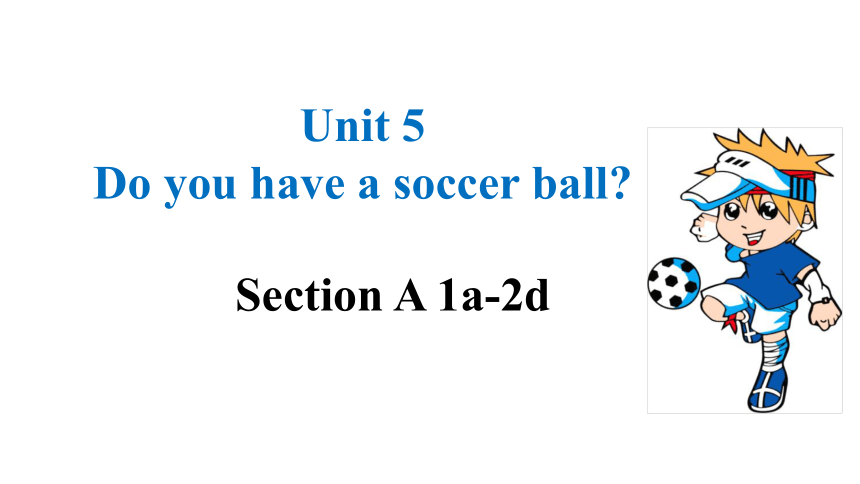 | |
| 格式 | pptx | ||
| 文件大小 | 10.8MB | ||
| 资源类型 | 教案 | ||
| 版本资源 | 人教新目标(Go for it)版 | ||
| 科目 | 英语 | ||
| 更新时间 | 2021-10-21 21:32:56 | ||
图片预览

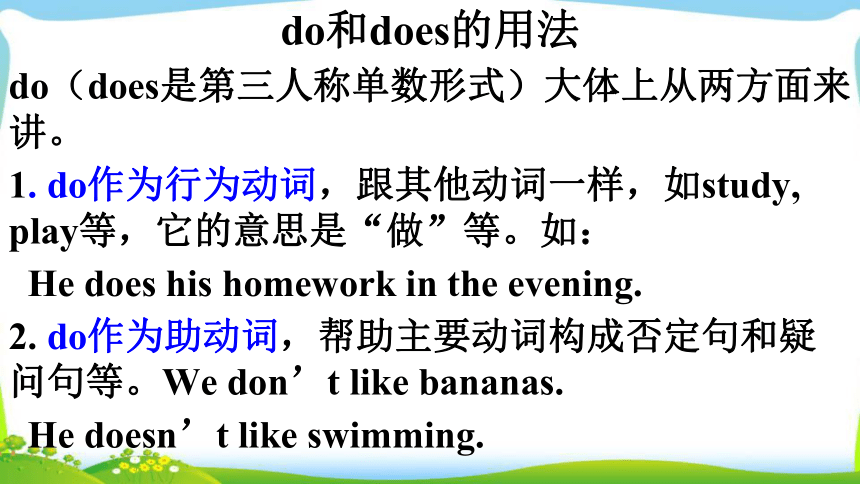
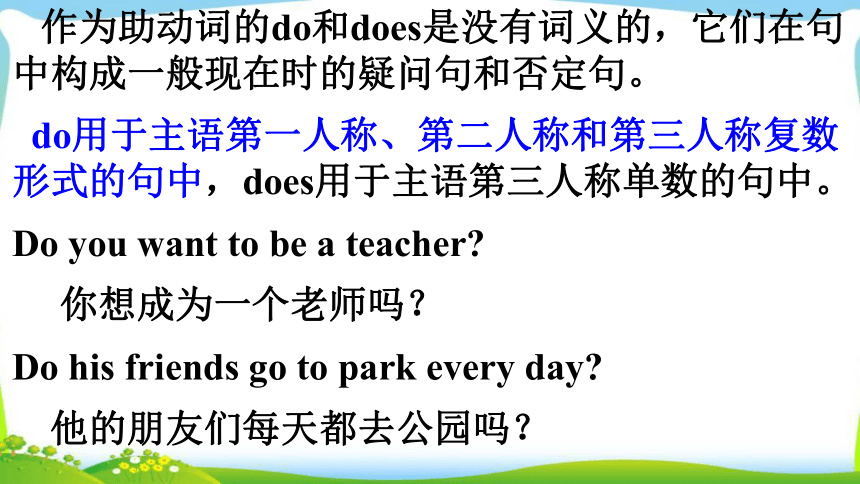
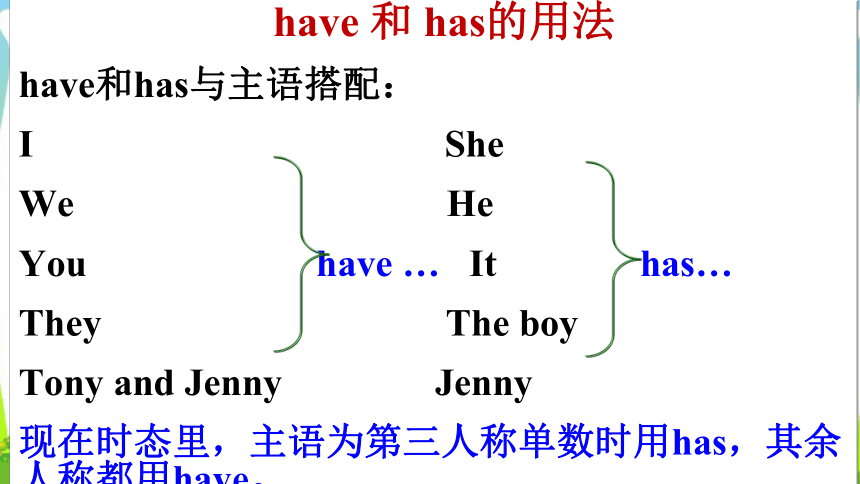
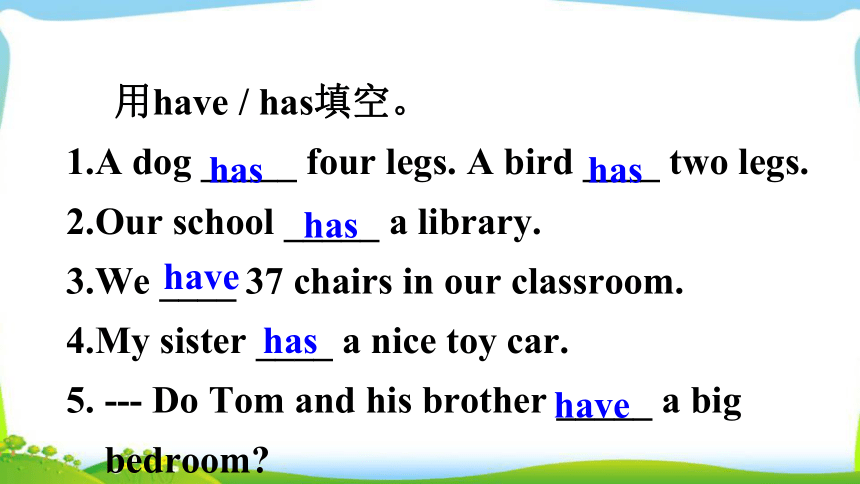
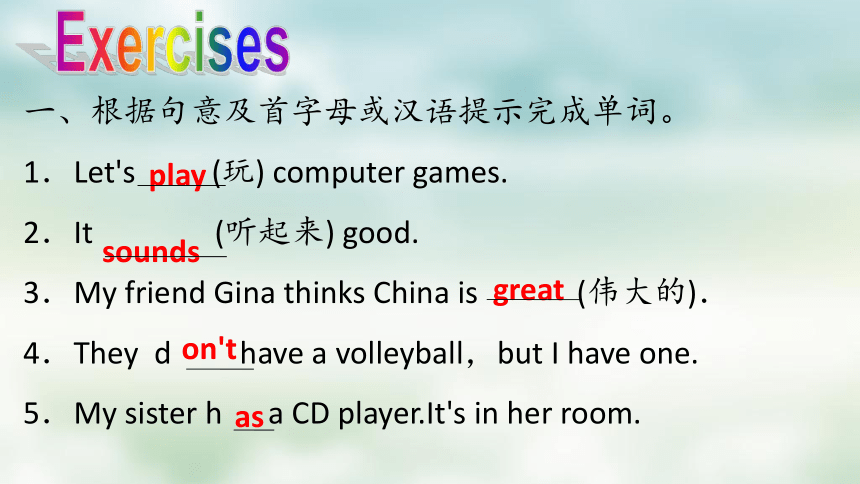
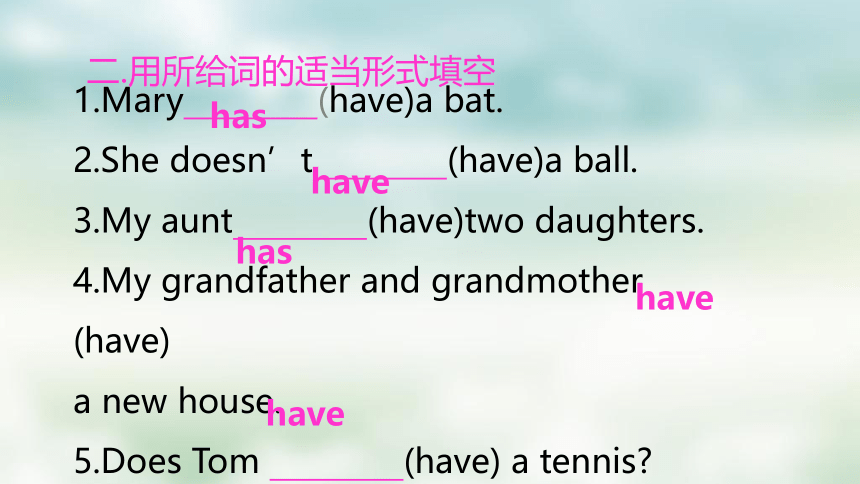
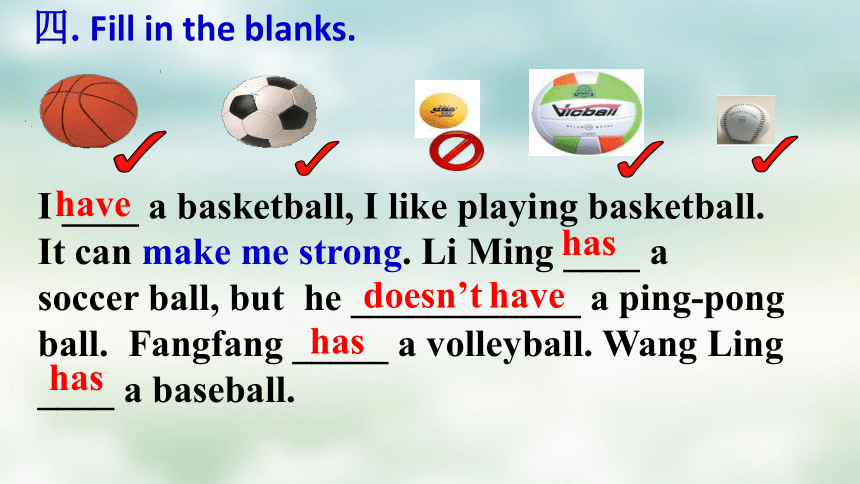
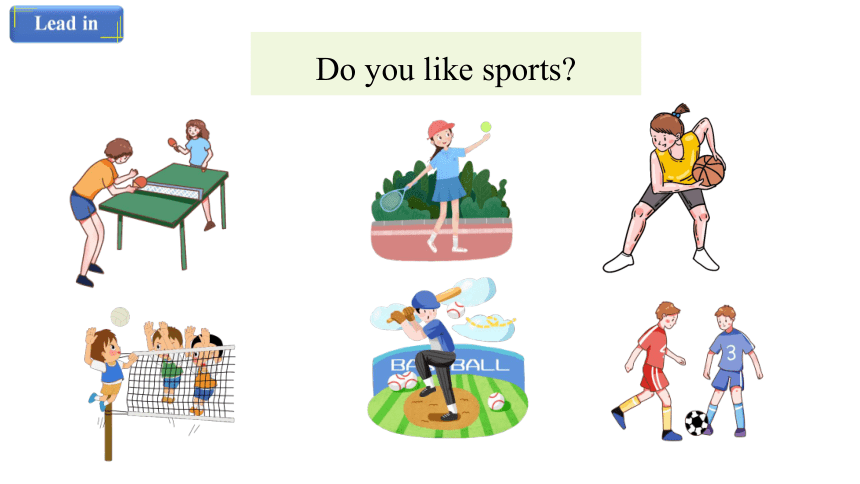
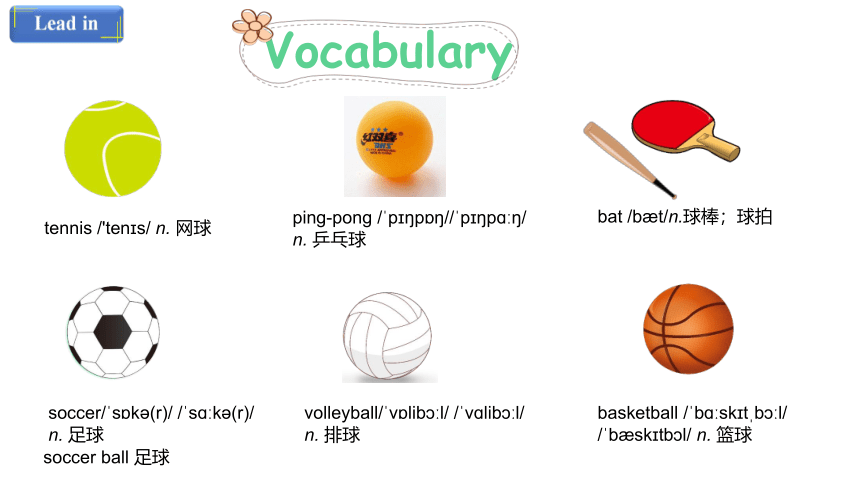

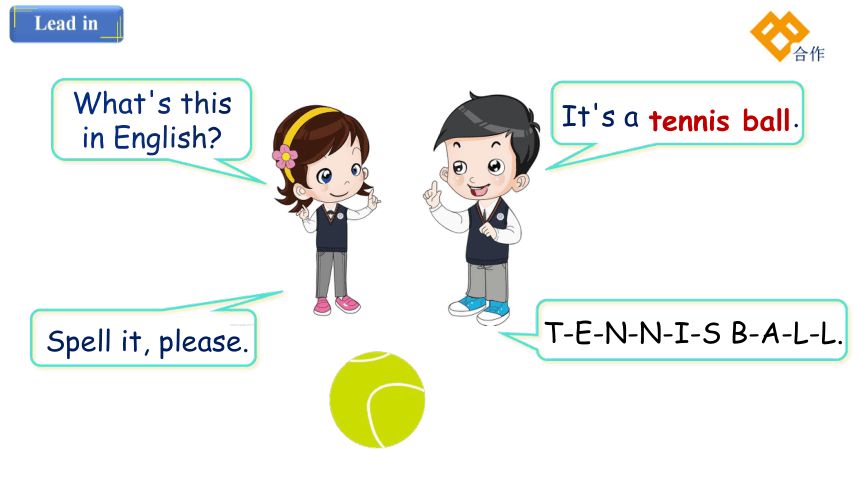
文档简介
(共72张PPT)
Section A 1a-2d
Unit 5
Do you have a soccer ball
do和does的用法
do(does是第三人称单数形式)大体上从两方面来讲。
1. do作为行为动词,跟其他动词一样,如study, play等,它的意思是“做”等。如:
He does his homework in the evening.
2. do作为助动词,帮助主要动词构成否定句和疑问句等。We don’t like bananas.
He doesn’t like swimming.
嚼碗迂薛随牵爹穴沈曹诚仑候溪疲睫园圭掷枕典伪堰续诉柠弱匡耶拧襄倪人教英语七年级上册Unit5Section A 3a—3c(共28张PPT)人教英语七年级上册Unit5Section A 3a—3c(共28张PPT)
作为助动词的do和does是没有词义的,它们在句中构成一般现在时的疑问句和否定句。
do用于主语第一人称、第二人称和第三人称复数形式的句中,does用于主语第三人称单数的句中。
Do you want to be a teacher
你想成为一个老师吗?
Do his friends go to park every day
他的朋友们每天都去公园吗?
亏代栓导崭媚探拓豺栗哪薄掀禹绪叭釜削硼官诺泵俐丛岿征假丁蝇都房谩人教英语七年级上册Unit5Section A 3a—3c(共28张PPT)人教英语七年级上册Unit5Section A 3a—3c(共28张PPT)
have 和 has的用法
have和has与主语搭配:
I She
We He
You have … It has…
They The boy
Tony and Jenny Jenny
现在时态里,主语为第三人称单数时用has,其余人称都用have。
瓦著己伶匪童淘屎堵趋打方谋召浚温檀砂担凹该聪宝效宋讫异馏眠镰筋蒋人教英语七年级上册Unit5Section A 3a—3c(共28张PPT)人教英语七年级上册Unit5Section A 3a—3c(共28张PPT)
用have / has填空。
1.A dog _____ four legs. A bird ____ two legs.
2.Our school _____ a library.
3.We ____ 37 chairs in our classroom.
4.My sister ____ a nice toy car.
5. --- Do Tom and his brother _____ a big
bedroom
--- Yes, they do.
has
has
has
have
has
have
四裂孕淡交惕梧核掘憎麻镊舞侍闰峙胞羞冉侗缴芍翅淀傈贤陨锁已彤燕磐人教英语七年级上册Unit5Section A 3a—3c(共28张PPT)人教英语七年级上册Unit5Section A 3a—3c(共28张PPT)
一、根据句意及首字母或汉语提示完成单词。
1.Let's (玩) computer games.
2.It (听起来) good.
3.My friend Gina thinks China is (伟大的).
4.They d have a volleyball,but I have one.
5.My sister h a CD player.It's in her room.
play
sounds
great
on't
as
Exercises
1.Mary (have)a bat.
2.She doesn’t (have)a ball.
3.My aunt (have)two daughters.
4.My grandfather and grandmother (have)
a new house.
5.Does Tom (have) a tennis
二.用所给词的适当形式填空
has
have
has
have
have
I ____ a basketball, I like playing basketball.
It can make me strong. Li Ming ____ a
soccer ball, but he ____________ a ping-pong
ball. Fangfang _____ a volleyball. Wang Ling
____ a baseball.
四. Fill in the blanks.
have
has
doesn’t have
has
has
Do you like sports
tennis /'ten s/ n. 网球
ping-pong / p p // p pɑ /
n. 乒乓球
bat /b t/n.球棒;球拍
soccer/ s k (r)/ / sɑ k (r)/
n. 足球
basketball / bɑ sk t b l/ / b sk tb l/ n. 篮球
volleyball/ v lib l/ / vɑlib l/
n. 排球
soccer ball 足球
Vocabulary
Pair work
What's that in English
basketball
It's a .
Spell it, please.
B-A-S-K-E-T-B-A-L-L.
T-E-N-N-I-S B-A-L-L.
What's this in English
It's a .
Spell it, please.
tennis ball
S-O-C-C-E-R B-A-L-L.
What's that in English
It's a .
Spell it, please.
soccer ball
V-O-L-L-E-Y-B-A-L-L.
What's this in English
It's a .
Spell it, please.
volleyball
P-I-N-G-P-O-N-G
B-A-L-L.
What's that in English
It's a .
Spell it, please.
ping-pong ball
B-A-S-E-B-A-L-L
B-A-T.
What's this in English
It's a .
Spell it, please.
baseball bat
P-I-N-G-P-O-N-G
B-A-T.
What's that in English
It's a .
Spell it, please.
ping-pong bat
1a
Match the words with the things in the picture.
1. tennis ball __
2. ping-pong bat __
3. soccer ball __
4. volleyball __
5. basketball __
6. baseball bat __
c
e
d
b
a
f
1b
Listen and circle the words your hear.
ping-pong bat soccer ball
volleyball ping-pong ball
1c
Practice the conversation with your partner. Then ask and answer questions about the things in the picture below.
A: Do you have a ping-pong bat
B: Yes, I do.
A: Do you have a ping-pong ball
B: No, I don’t.
有,拥有
Conversation
Do you have __________
No, I don't.
×
a tennis ball
√
Do you have ____________
a baseball bat
Yes, I do.
Does he have __________
a volleyball
√
Yes, he does.
Does she have _____________
×
a ping-pong bat
No, she doesn't.
C
D
B
B
B
五、按要求完成下列句子。
1.—Frank has a black tape player.(改为一般疑问句并作肯定回答)
—________Frank ________ a black tape player
—________________.
2.I have a red schoolbag.(改为一般疑问句并作否定回答)
—________ you ________ a red schoolbag
—____________.
Does
have
Yes,he does
Do
have
No,I don't
3.He has a sister.(改为否定句)
He _______________ a sister.
4.My grandparents have a white dog.(改为否定句)
My grandparents ____________ a white dog.
5.She has a nice cup.(用they代替she改写句子)
____________ nice __________.
doesn't have
don't have
They have
cups
Listen to the conversations and number the pictures [1-4].
1
3
4
2
2a
Listen again. Match the pictures in 2a with the balls.
1
3
2
4
2b
Listen again and fill in the blanks.
Conversation 2
Conversation 1
Bob: Do you have a
___________, Paul
Paul: No, I don’t.
Bob: Does your brother Alan
have one
Paul: _____________
soccer ball
Yes, he does.
John: Hi, Mike.
Mike: Hi, John.
John: I want to ____________.
Do you ______________
Mike: Yes, I do.
John: Great!
play basketball
have a basketball
Conversation 3
Conversation 4
Jane: Hi, Sally.
Sally: Hi, Jane.
Jane: Sally, this is _________, Anna.
Sally: Hi, Anna. Nice to meet you.
Anna: ________________, Sally.
Sally: Let’s ___________.
Do you have a __________, Jane
Jane: Sorry, I don’t.
my friend
Nice to meet you
play tennis
tennis ball
Frank: Do you ______________, Dale
Dale: No, I don’t.
But my brother does.
Let’s _______________.
have a volleyball
go and find him
Ask and answer questions about the people in 2a.
2c
Does Jane have a tennis ball
No, she doesn’t.
Does Mike have a basketball
Yes, .
he does
Does Paul have a soccer ball
No, .
he doesn't
Look at the picture.
Guess what they are talking about.
Listen and role-play the conversation.
Cindy: Hey, Helen, let's go! We're late!
Helen: OK.
Cindy: Do you have the baseball
Helen: Yes, I do. It's in my bag.
Cindy: And where's our baseball bat
Helen: Bill has it.
Cindy: Oh, yeah. And do you have your jacket
Helen: Oh, no, I don't. It's on the chair. Let me get it.
Cindy: And your hat, too!
Helen: OK, I have my jacket and hat. Let's go!
咱们走吧!
我们迟到了!
我去拿(它)。
late adj. 迟到
be late for……迟到
get v. 去取(或带来);得到
2d
1. Do you have a ping-pong bat
1) do在此处是助动词,没有实际意义,主要用于构成行为动词的疑问句或否定句。第三人称单数形式为does。例如:
Do you go to school at 7:30 你七点半去上学吗?
He doesn’t like this book. 他不喜欢这本书。
2) do还可作行为动词, 意为“做;干”。例如:
I do my homework after dinner. 晚饭后我做家庭作业。
句式剖析:本句是含行为动词have的一般现在时的一般疑问句, 其构成为: Do/ Does + 主语+ have + 宾语?
(1) do 的用法
have意为“有,拥有”;可以用have(第三人称单数:has)表示物品所属关系。
have的一般疑问句可以用来询问物品所属关系:
Do you/they have… Does he/she have…
肯定回答:Yes, I/they do. Yes, he/she does.
否定回答:No, I/they don’t. No, he/she doesn’t.
(2) have 的用法
1. Do you have a ping-pong bat
I have a red bike. She has a blue one.
我有一辆红色自行车。她有一辆蓝色自行车。
There is a bike in the yard. 院子里有一辆自行车。
have 表示“拥有”, 强调所属关系, 意为“某人有某物”。
there be 强调存在关系, 意为“某地有某人/ 某物”。
易混辨析: have 与 there be
1. Do you have a ping-pong bat
2. Hey, Helen, let's go!
(1)Let's... 咱们……吧。
该句型常用于提出建议或请求对方与自己一起做某事,
Let's后接动词原形。
肯定回答:OK./All right./That sounds good./Good idea./...
否定回答:Sorry, I... 对不起,我……
例如:
Let’s play basketball after school.
That sounds good. / Sorry, I have to do my homework.
2. Hey, Helen, let's go!
let作动词,常用结构 let sb. do sth.意为“让某人做某事”。其中sb.要用人称代词的宾格形式,do要用动词原形。例如:
Let me help you. 让我帮你吧。
(2) let v. 允许;让
(3) us pron. (we的宾格)我们
us是人称代词we的宾格形式,一般放在谓语动词或介词后面作宾语。主格人称代词we一般放句首作主语。例如:
She gives us a picture. 她赠给我们一幅画。
We are good friends. 我们是好朋友。
2. Hey, Helen, let's go!
go作动词,其反义词为come “来”。go 常用于“go to+地点名词”或“go+地点副词” 结构。例如:
My brother goes to school by bike every morning.
我哥哥每天早晨骑自行车去上学。
Let’s go home. 咱们回家吧。
(4) go v. 去;走
be late for=come late to 迟到
be late译为“迟到”,一般其后跟介词“for”表“做某事迟到”。
例如:
be late for class 上课迟到
3. We are late!
一、将图片与对应单词或短语相连
soccer ball
tennis ball
volleyball
basketball
1. —Do you have a red jacket
—_______. But I have a blue jacket.
A. No, I don’t. B. Yes, I do.
C. Yes, I have. D. No, it isn’t.
2. —_______ your sister have a tennis bat
—No, she _______.
A. Do, don’t B. Do, doesn’t
C. Does, doesn’t D. Does, don’t
Exercises
二、单项选择
A
C
3. — _______ you have a volleyball
— No, I _____. But my sister ____ a new one.
A. Do; don’t; have B. Do; don’t; has
C. Does; doesn’t; have D. Does; doesn’t; has
4. —Does Tom have a basketball
—Yes, ____________
A. I am B. it is C. you do D. he does
B
D
二、单项选择
1. --你有一个棒球吗? ______ you _______ a baseball
--是的。_______, I _____.
--不,我没有。______, I ________.
2. 让我们走吧。 _______________
3. 我们上学迟到了。 __________________________
4. 让我去拿它。 _______________
5. 麦克有个排球。 ______________________
Do have
Yes do
No don’t
We are late for school.
Let’s go.
Let me get it.
Mike has a volleyball.
三. 完成句子
Grammar Focus
Do you have a baseball Yes, I do./No, I don't.
I have a volleyball.
Do you have a ping-pong bat Yes, I do./No, I don't.
I have a ping-pong ball.
Does she have a tennis ball Yes, she does./No, she doesn't.
She has a baseball.
Does he have a soccer ball Yes, he do./No, he doesn't.
He has two ping-pong bats.
Do they have a basketball Yes, they do./No, they don't.
They have a volleyball.
don't=do not doesn't=does not
1. 你有一个棒球吗?____ you _____ a baseball
2. 是的。____, I ___. 不,没有。____, I ______.
3. 你有一个乒乓拍吗?
____ you _____ a ping-pong ____
4. 没有。我有一个乒乓球。
___, I ______. I _____ a ping-pong ____.
5. 她有一个网球吗? _____ she _____ a tennis
Grammar Focus
Do have
Does have
Do have bat
Yes do
have ball
一、重点句型
No don’t
No don’t
9. 没有。他有两个乒乓球拍。
____, he _______. He ____ two ping-pong
_____.
10. 他们有一个篮球吗?___ they _____ a
basketball
No doesn’t
has
Do have
8. 他有一个足球吗?_____ he _____ a _____ ball
Does have soccer
bats
6. 是,她有。 _____, she _____.
7. 没有。她有一个棒球。
____, she _______. She ____ a ________.
Yes does
has baseball
No doesn’t
写出下列表达方式的缩写形式
1. do not = ______ 2. does not = _______
3. we are = ______ 4. let us = _____
don’t
doesn’t
we’re
let’s
11. 是的,有。 Yes, _____ _____.
12. 没有。他们有一个排球。
____, they _____. They _____ a _________.
they do
No don’t
have volleyball
英语中的人称和数(在一般现在时态中)
第一人称单数:I(我)
第一人称复数:we(我们)
be遇到I
am
have遇到I
have(不变)
I’m a girl. 我是一名女孩。
I have a volleyball. 我有一个足球。
be遇到we
are
have遇到we
have(不变)
We’re good friends. 我们是好朋友。
We have two baseball bats. 我有两个棒球拍。
第二人称单复数:you(你;你们)
第三人称单数:he; she; it; 人名
be遇到you
are
have遇到you
have(不变)
You are my cousin. 你是我的表弟。
You have three ping-pong pats. 你(们)有三只乒乓球拍。
be
is
have
has
Linda is in her parents’ room. 琳达在她父母的房间里。
Ms Miller has two daughters. 米勒女士有两个女儿。
第三人称复数:they(他们);多个人名;物品复数等
be遇到they
are
have遇到they
have(不变)
Three basketballs are in the box.
在盒子里有三个篮球。
They have four volleyballs and two tennis ball.
他们有四个排球和二个网球。
Mike and Jenny are classmates.
麦克和珍妮是同学。
“Do you have… ” “表示你有……吗?”
询问物品的所属关系。是实义动词的一般疑问句结构。
主语是第一人称/第二人称/第三人称复数时,句型结构为:
Do + you/they/we/… + 动词原形 + …?
答语:
肯定回答:Yes, I do./ Yes, we do. / Yes, they do.
否定回答:No, I don’t /we don’t. /No, they don’t.
例: — Do they like basketball 他们喜欢打篮球吗?
— Yes, they do. 是的,他们喜欢。
— No, they don’t. 不,他们不喜欢。
当主语为第三人称单数时,句子结构为:
Does + he / she / it … + 动词原形 + …?
答语:
肯定回答:Yes, he does./Yes, she does./Yes, it does.
否定回答:No, he doesn’t./No, she doesn’t ./No, it doesn’t.
例:— Does Jane have a new book 简有一本新书吗?
— Yes, she does. 是的,她有。
— No, she doesn’t. 不,她没有。
人称 汉语 主格 助动词 宾格
单数 第一人称 我 I me
第二人称 你 you you
第三人称 他,Eric等 he
她,Linda等 she her
它 it
复数 第一人称 我们
第二人称 你们 you you
第三人称 他们,它们
do
they
him
it
us
them
do
does
we
人称与数
3a
Write each word in the correct place in the chart.
I he they you
we she it Eric
do does
I; they; you; we; it
he, she; it; Eric
1. A: _____ you have a baseball
B: Yes, I ____.
A: Great! I have a bat. Let’s play.
Fill in the blanks with do or does. Then practice the conversations with your partner.
Do
do
第一( I )、二 (you)人称用do
3b
2. A: _____ John have a soccer ball
B: No, he ________.
A: _____ he have a ping-pong bat
B: Yes, he ______. I think he has a
ping-pong ball, too.
A: Hmm … let’s ask.
Does
doesn’t
Does
does
第三人称单数(John, he)用does
3. A: ____ your friends have a basketball
B: Yes, they ____. They have two
basketballs.
A: Well, let’s play basketball.
B: That sounds good.
Do
do
第三人称复数(your friends, they)用do。
Remember the things in Bob’s room. Then close your books and ask and answer questions with a partner.
A: Does Bob have a soccer ball
B: Yes, he does.
3c
Game's time
看谁记的快!
Does Bob have a hat
Yes, he does.
Does Bob have a jacket
Yes, he does.
Where’s the jacket
It’s on the bed.
Does Bob have a ping-pong bat
No, he doesn’t.
Where’s Bob’s basketball
It’s on the floor.
1. Great! I have a bat. 好极了!我有一根球棒。
great(adj.)
“伟大的”
“美妙的;很棒的”
That sounds great.
那听起来太棒了。
Lu Xun is a great person.
鲁迅是一位伟大的人物。
2. Well, let's play basketball. 好,让我们去打篮球吧。
play(v.)
及物动词,意为“参加(比赛或运动)”
play与球类,棋类运动名词之间不加冠词。
动词;意为“玩耍”。play with sb./sth.与某人一起玩/玩某物
后接表示乐器的名词时,在乐器类名词前要加定冠词the。
He often plays volleyball after school.
他放学后经常打排球。
Tom is playing with Sam. They are playing with a ball in the street.
汤姆正在和萨姆一起玩。他们正在街上玩球。
Mario can play the piano.
马里奥会弹钢琴。
3. That sounds good. 那听起来不错。
sound在句中作系动词,意为“听起来”,其后
接形容词。其三单形式为sounds。例如:
The music sounds beautiful.
音乐听起来很美妙。
The idea sounds great.
这个主意听起来很棒。
【拓展】
sound作名词时,意为“声音”。 例如:
the sound of music 音乐之声
1. Peter can play soccer ball, but he can’t play violin.
A. the; the B. the; / C. /; the D. /; a
2. Let’s after class.
A. to play the chess B. play the chess
C. to play chess D. play chess
3. — _______ Anna _______ a ping-pong bat
— Yes, she _______.
A. Do; have; do B. Does; have; does
C. Do; have; has D. Does; have; has
I. 单项选择
4. Hurry up (快点) , Mary! We’re _______!
A. late B. great C. good D. tidy
5. —What about going to Shanghai Disneyland Park next month, Harry
—______ !We’ll have a lot of fun there.
A. Good luck B. Never mind
C. Sounds great D. Certainly not
Section A 1a-2d
Unit 5
Do you have a soccer ball
do和does的用法
do(does是第三人称单数形式)大体上从两方面来讲。
1. do作为行为动词,跟其他动词一样,如study, play等,它的意思是“做”等。如:
He does his homework in the evening.
2. do作为助动词,帮助主要动词构成否定句和疑问句等。We don’t like bananas.
He doesn’t like swimming.
嚼碗迂薛随牵爹穴沈曹诚仑候溪疲睫园圭掷枕典伪堰续诉柠弱匡耶拧襄倪人教英语七年级上册Unit5Section A 3a—3c(共28张PPT)人教英语七年级上册Unit5Section A 3a—3c(共28张PPT)
作为助动词的do和does是没有词义的,它们在句中构成一般现在时的疑问句和否定句。
do用于主语第一人称、第二人称和第三人称复数形式的句中,does用于主语第三人称单数的句中。
Do you want to be a teacher
你想成为一个老师吗?
Do his friends go to park every day
他的朋友们每天都去公园吗?
亏代栓导崭媚探拓豺栗哪薄掀禹绪叭釜削硼官诺泵俐丛岿征假丁蝇都房谩人教英语七年级上册Unit5Section A 3a—3c(共28张PPT)人教英语七年级上册Unit5Section A 3a—3c(共28张PPT)
have 和 has的用法
have和has与主语搭配:
I She
We He
You have … It has…
They The boy
Tony and Jenny Jenny
现在时态里,主语为第三人称单数时用has,其余人称都用have。
瓦著己伶匪童淘屎堵趋打方谋召浚温檀砂担凹该聪宝效宋讫异馏眠镰筋蒋人教英语七年级上册Unit5Section A 3a—3c(共28张PPT)人教英语七年级上册Unit5Section A 3a—3c(共28张PPT)
用have / has填空。
1.A dog _____ four legs. A bird ____ two legs.
2.Our school _____ a library.
3.We ____ 37 chairs in our classroom.
4.My sister ____ a nice toy car.
5. --- Do Tom and his brother _____ a big
bedroom
--- Yes, they do.
has
has
has
have
has
have
四裂孕淡交惕梧核掘憎麻镊舞侍闰峙胞羞冉侗缴芍翅淀傈贤陨锁已彤燕磐人教英语七年级上册Unit5Section A 3a—3c(共28张PPT)人教英语七年级上册Unit5Section A 3a—3c(共28张PPT)
一、根据句意及首字母或汉语提示完成单词。
1.Let's (玩) computer games.
2.It (听起来) good.
3.My friend Gina thinks China is (伟大的).
4.They d have a volleyball,but I have one.
5.My sister h a CD player.It's in her room.
play
sounds
great
on't
as
Exercises
1.Mary (have)a bat.
2.She doesn’t (have)a ball.
3.My aunt (have)two daughters.
4.My grandfather and grandmother (have)
a new house.
5.Does Tom (have) a tennis
二.用所给词的适当形式填空
has
have
has
have
have
I ____ a basketball, I like playing basketball.
It can make me strong. Li Ming ____ a
soccer ball, but he ____________ a ping-pong
ball. Fangfang _____ a volleyball. Wang Ling
____ a baseball.
四. Fill in the blanks.
have
has
doesn’t have
has
has
Do you like sports
tennis /'ten s/ n. 网球
ping-pong / p p // p pɑ /
n. 乒乓球
bat /b t/n.球棒;球拍
soccer/ s k (r)/ / sɑ k (r)/
n. 足球
basketball / bɑ sk t b l/ / b sk tb l/ n. 篮球
volleyball/ v lib l/ / vɑlib l/
n. 排球
soccer ball 足球
Vocabulary
Pair work
What's that in English
basketball
It's a .
Spell it, please.
B-A-S-K-E-T-B-A-L-L.
T-E-N-N-I-S B-A-L-L.
What's this in English
It's a .
Spell it, please.
tennis ball
S-O-C-C-E-R B-A-L-L.
What's that in English
It's a .
Spell it, please.
soccer ball
V-O-L-L-E-Y-B-A-L-L.
What's this in English
It's a .
Spell it, please.
volleyball
P-I-N-G-P-O-N-G
B-A-L-L.
What's that in English
It's a .
Spell it, please.
ping-pong ball
B-A-S-E-B-A-L-L
B-A-T.
What's this in English
It's a .
Spell it, please.
baseball bat
P-I-N-G-P-O-N-G
B-A-T.
What's that in English
It's a .
Spell it, please.
ping-pong bat
1a
Match the words with the things in the picture.
1. tennis ball __
2. ping-pong bat __
3. soccer ball __
4. volleyball __
5. basketball __
6. baseball bat __
c
e
d
b
a
f
1b
Listen and circle the words your hear.
ping-pong bat soccer ball
volleyball ping-pong ball
1c
Practice the conversation with your partner. Then ask and answer questions about the things in the picture below.
A: Do you have a ping-pong bat
B: Yes, I do.
A: Do you have a ping-pong ball
B: No, I don’t.
有,拥有
Conversation
Do you have __________
No, I don't.
×
a tennis ball
√
Do you have ____________
a baseball bat
Yes, I do.
Does he have __________
a volleyball
√
Yes, he does.
Does she have _____________
×
a ping-pong bat
No, she doesn't.
C
D
B
B
B
五、按要求完成下列句子。
1.—Frank has a black tape player.(改为一般疑问句并作肯定回答)
—________Frank ________ a black tape player
—________________.
2.I have a red schoolbag.(改为一般疑问句并作否定回答)
—________ you ________ a red schoolbag
—____________.
Does
have
Yes,he does
Do
have
No,I don't
3.He has a sister.(改为否定句)
He _______________ a sister.
4.My grandparents have a white dog.(改为否定句)
My grandparents ____________ a white dog.
5.She has a nice cup.(用they代替she改写句子)
____________ nice __________.
doesn't have
don't have
They have
cups
Listen to the conversations and number the pictures [1-4].
1
3
4
2
2a
Listen again. Match the pictures in 2a with the balls.
1
3
2
4
2b
Listen again and fill in the blanks.
Conversation 2
Conversation 1
Bob: Do you have a
___________, Paul
Paul: No, I don’t.
Bob: Does your brother Alan
have one
Paul: _____________
soccer ball
Yes, he does.
John: Hi, Mike.
Mike: Hi, John.
John: I want to ____________.
Do you ______________
Mike: Yes, I do.
John: Great!
play basketball
have a basketball
Conversation 3
Conversation 4
Jane: Hi, Sally.
Sally: Hi, Jane.
Jane: Sally, this is _________, Anna.
Sally: Hi, Anna. Nice to meet you.
Anna: ________________, Sally.
Sally: Let’s ___________.
Do you have a __________, Jane
Jane: Sorry, I don’t.
my friend
Nice to meet you
play tennis
tennis ball
Frank: Do you ______________, Dale
Dale: No, I don’t.
But my brother does.
Let’s _______________.
have a volleyball
go and find him
Ask and answer questions about the people in 2a.
2c
Does Jane have a tennis ball
No, she doesn’t.
Does Mike have a basketball
Yes, .
he does
Does Paul have a soccer ball
No, .
he doesn't
Look at the picture.
Guess what they are talking about.
Listen and role-play the conversation.
Cindy: Hey, Helen, let's go! We're late!
Helen: OK.
Cindy: Do you have the baseball
Helen: Yes, I do. It's in my bag.
Cindy: And where's our baseball bat
Helen: Bill has it.
Cindy: Oh, yeah. And do you have your jacket
Helen: Oh, no, I don't. It's on the chair. Let me get it.
Cindy: And your hat, too!
Helen: OK, I have my jacket and hat. Let's go!
咱们走吧!
我们迟到了!
我去拿(它)。
late adj. 迟到
be late for……迟到
get v. 去取(或带来);得到
2d
1. Do you have a ping-pong bat
1) do在此处是助动词,没有实际意义,主要用于构成行为动词的疑问句或否定句。第三人称单数形式为does。例如:
Do you go to school at 7:30 你七点半去上学吗?
He doesn’t like this book. 他不喜欢这本书。
2) do还可作行为动词, 意为“做;干”。例如:
I do my homework after dinner. 晚饭后我做家庭作业。
句式剖析:本句是含行为动词have的一般现在时的一般疑问句, 其构成为: Do/ Does + 主语+ have + 宾语?
(1) do 的用法
have意为“有,拥有”;可以用have(第三人称单数:has)表示物品所属关系。
have的一般疑问句可以用来询问物品所属关系:
Do you/they have… Does he/she have…
肯定回答:Yes, I/they do. Yes, he/she does.
否定回答:No, I/they don’t. No, he/she doesn’t.
(2) have 的用法
1. Do you have a ping-pong bat
I have a red bike. She has a blue one.
我有一辆红色自行车。她有一辆蓝色自行车。
There is a bike in the yard. 院子里有一辆自行车。
have 表示“拥有”, 强调所属关系, 意为“某人有某物”。
there be 强调存在关系, 意为“某地有某人/ 某物”。
易混辨析: have 与 there be
1. Do you have a ping-pong bat
2. Hey, Helen, let's go!
(1)Let's... 咱们……吧。
该句型常用于提出建议或请求对方与自己一起做某事,
Let's后接动词原形。
肯定回答:OK./All right./That sounds good./Good idea./...
否定回答:Sorry, I... 对不起,我……
例如:
Let’s play basketball after school.
That sounds good. / Sorry, I have to do my homework.
2. Hey, Helen, let's go!
let作动词,常用结构 let sb. do sth.意为“让某人做某事”。其中sb.要用人称代词的宾格形式,do要用动词原形。例如:
Let me help you. 让我帮你吧。
(2) let v. 允许;让
(3) us pron. (we的宾格)我们
us是人称代词we的宾格形式,一般放在谓语动词或介词后面作宾语。主格人称代词we一般放句首作主语。例如:
She gives us a picture. 她赠给我们一幅画。
We are good friends. 我们是好朋友。
2. Hey, Helen, let's go!
go作动词,其反义词为come “来”。go 常用于“go to+地点名词”或“go+地点副词” 结构。例如:
My brother goes to school by bike every morning.
我哥哥每天早晨骑自行车去上学。
Let’s go home. 咱们回家吧。
(4) go v. 去;走
be late for=come late to 迟到
be late译为“迟到”,一般其后跟介词“for”表“做某事迟到”。
例如:
be late for class 上课迟到
3. We are late!
一、将图片与对应单词或短语相连
soccer ball
tennis ball
volleyball
basketball
1. —Do you have a red jacket
—_______. But I have a blue jacket.
A. No, I don’t. B. Yes, I do.
C. Yes, I have. D. No, it isn’t.
2. —_______ your sister have a tennis bat
—No, she _______.
A. Do, don’t B. Do, doesn’t
C. Does, doesn’t D. Does, don’t
Exercises
二、单项选择
A
C
3. — _______ you have a volleyball
— No, I _____. But my sister ____ a new one.
A. Do; don’t; have B. Do; don’t; has
C. Does; doesn’t; have D. Does; doesn’t; has
4. —Does Tom have a basketball
—Yes, ____________
A. I am B. it is C. you do D. he does
B
D
二、单项选择
1. --你有一个棒球吗? ______ you _______ a baseball
--是的。_______, I _____.
--不,我没有。______, I ________.
2. 让我们走吧。 _______________
3. 我们上学迟到了。 __________________________
4. 让我去拿它。 _______________
5. 麦克有个排球。 ______________________
Do have
Yes do
No don’t
We are late for school.
Let’s go.
Let me get it.
Mike has a volleyball.
三. 完成句子
Grammar Focus
Do you have a baseball Yes, I do./No, I don't.
I have a volleyball.
Do you have a ping-pong bat Yes, I do./No, I don't.
I have a ping-pong ball.
Does she have a tennis ball Yes, she does./No, she doesn't.
She has a baseball.
Does he have a soccer ball Yes, he do./No, he doesn't.
He has two ping-pong bats.
Do they have a basketball Yes, they do./No, they don't.
They have a volleyball.
don't=do not doesn't=does not
1. 你有一个棒球吗?____ you _____ a baseball
2. 是的。____, I ___. 不,没有。____, I ______.
3. 你有一个乒乓拍吗?
____ you _____ a ping-pong ____
4. 没有。我有一个乒乓球。
___, I ______. I _____ a ping-pong ____.
5. 她有一个网球吗? _____ she _____ a tennis
Grammar Focus
Do have
Does have
Do have bat
Yes do
have ball
一、重点句型
No don’t
No don’t
9. 没有。他有两个乒乓球拍。
____, he _______. He ____ two ping-pong
_____.
10. 他们有一个篮球吗?___ they _____ a
basketball
No doesn’t
has
Do have
8. 他有一个足球吗?_____ he _____ a _____ ball
Does have soccer
bats
6. 是,她有。 _____, she _____.
7. 没有。她有一个棒球。
____, she _______. She ____ a ________.
Yes does
has baseball
No doesn’t
写出下列表达方式的缩写形式
1. do not = ______ 2. does not = _______
3. we are = ______ 4. let us = _____
don’t
doesn’t
we’re
let’s
11. 是的,有。 Yes, _____ _____.
12. 没有。他们有一个排球。
____, they _____. They _____ a _________.
they do
No don’t
have volleyball
英语中的人称和数(在一般现在时态中)
第一人称单数:I(我)
第一人称复数:we(我们)
be遇到I
am
have遇到I
have(不变)
I’m a girl. 我是一名女孩。
I have a volleyball. 我有一个足球。
be遇到we
are
have遇到we
have(不变)
We’re good friends. 我们是好朋友。
We have two baseball bats. 我有两个棒球拍。
第二人称单复数:you(你;你们)
第三人称单数:he; she; it; 人名
be遇到you
are
have遇到you
have(不变)
You are my cousin. 你是我的表弟。
You have three ping-pong pats. 你(们)有三只乒乓球拍。
be
is
have
has
Linda is in her parents’ room. 琳达在她父母的房间里。
Ms Miller has two daughters. 米勒女士有两个女儿。
第三人称复数:they(他们);多个人名;物品复数等
be遇到they
are
have遇到they
have(不变)
Three basketballs are in the box.
在盒子里有三个篮球。
They have four volleyballs and two tennis ball.
他们有四个排球和二个网球。
Mike and Jenny are classmates.
麦克和珍妮是同学。
“Do you have… ” “表示你有……吗?”
询问物品的所属关系。是实义动词的一般疑问句结构。
主语是第一人称/第二人称/第三人称复数时,句型结构为:
Do + you/they/we/… + 动词原形 + …?
答语:
肯定回答:Yes, I do./ Yes, we do. / Yes, they do.
否定回答:No, I don’t /we don’t. /No, they don’t.
例: — Do they like basketball 他们喜欢打篮球吗?
— Yes, they do. 是的,他们喜欢。
— No, they don’t. 不,他们不喜欢。
当主语为第三人称单数时,句子结构为:
Does + he / she / it … + 动词原形 + …?
答语:
肯定回答:Yes, he does./Yes, she does./Yes, it does.
否定回答:No, he doesn’t./No, she doesn’t ./No, it doesn’t.
例:— Does Jane have a new book 简有一本新书吗?
— Yes, she does. 是的,她有。
— No, she doesn’t. 不,她没有。
人称 汉语 主格 助动词 宾格
单数 第一人称 我 I me
第二人称 你 you you
第三人称 他,Eric等 he
她,Linda等 she her
它 it
复数 第一人称 我们
第二人称 你们 you you
第三人称 他们,它们
do
they
him
it
us
them
do
does
we
人称与数
3a
Write each word in the correct place in the chart.
I he they you
we she it Eric
do does
I; they; you; we; it
he, she; it; Eric
1. A: _____ you have a baseball
B: Yes, I ____.
A: Great! I have a bat. Let’s play.
Fill in the blanks with do or does. Then practice the conversations with your partner.
Do
do
第一( I )、二 (you)人称用do
3b
2. A: _____ John have a soccer ball
B: No, he ________.
A: _____ he have a ping-pong bat
B: Yes, he ______. I think he has a
ping-pong ball, too.
A: Hmm … let’s ask.
Does
doesn’t
Does
does
第三人称单数(John, he)用does
3. A: ____ your friends have a basketball
B: Yes, they ____. They have two
basketballs.
A: Well, let’s play basketball.
B: That sounds good.
Do
do
第三人称复数(your friends, they)用do。
Remember the things in Bob’s room. Then close your books and ask and answer questions with a partner.
A: Does Bob have a soccer ball
B: Yes, he does.
3c
Game's time
看谁记的快!
Does Bob have a hat
Yes, he does.
Does Bob have a jacket
Yes, he does.
Where’s the jacket
It’s on the bed.
Does Bob have a ping-pong bat
No, he doesn’t.
Where’s Bob’s basketball
It’s on the floor.
1. Great! I have a bat. 好极了!我有一根球棒。
great(adj.)
“伟大的”
“美妙的;很棒的”
That sounds great.
那听起来太棒了。
Lu Xun is a great person.
鲁迅是一位伟大的人物。
2. Well, let's play basketball. 好,让我们去打篮球吧。
play(v.)
及物动词,意为“参加(比赛或运动)”
play与球类,棋类运动名词之间不加冠词。
动词;意为“玩耍”。play with sb./sth.与某人一起玩/玩某物
后接表示乐器的名词时,在乐器类名词前要加定冠词the。
He often plays volleyball after school.
他放学后经常打排球。
Tom is playing with Sam. They are playing with a ball in the street.
汤姆正在和萨姆一起玩。他们正在街上玩球。
Mario can play the piano.
马里奥会弹钢琴。
3. That sounds good. 那听起来不错。
sound在句中作系动词,意为“听起来”,其后
接形容词。其三单形式为sounds。例如:
The music sounds beautiful.
音乐听起来很美妙。
The idea sounds great.
这个主意听起来很棒。
【拓展】
sound作名词时,意为“声音”。 例如:
the sound of music 音乐之声
1. Peter can play soccer ball, but he can’t play violin.
A. the; the B. the; / C. /; the D. /; a
2. Let’s after class.
A. to play the chess B. play the chess
C. to play chess D. play chess
3. — _______ Anna _______ a ping-pong bat
— Yes, she _______.
A. Do; have; do B. Does; have; does
C. Do; have; has D. Does; have; has
I. 单项选择
4. Hurry up (快点) , Mary! We’re _______!
A. late B. great C. good D. tidy
5. —What about going to Shanghai Disneyland Park next month, Harry
—______ !We’ll have a lot of fun there.
A. Good luck B. Never mind
C. Sounds great D. Certainly not
同课章节目录
- starters 预备篇(2012秋审查)
- Unit 1 Good morning !
- Unit 2 What’s this in English?
- Unit 3 What color is it ?
- Unit 1 My name's Gina.
- Section A
- Section B
- Unit 2 This is my sister.
- Section A
- Section B
- Unit 3 Is this your pencil?
- Section A
- Section B
- Unit 4 Where's my schoolbag?
- Section A
- Section B
- Unit 5 Do you have a soccer ball?
- Section A
- Section B
- Unit 6 Do you like bananas?
- Section A
- Section B
- Unit 7 How much are these socks?
- Section A
- Section B
- Unit 8 When is your birthday?
- Section A
- Section B
- Unit 9 My favorite subject is science.
- Section A
- Section B
